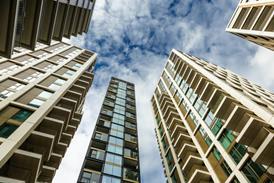Following the Grenfell fire, freeholders and leaseholders are facing significant difficulties in ensuring their homes are safe and that defective cladding is replaced. Oliver Pannell provides an update on the government’s response and recent case law
Two independent inquiries into cladding have been launched as a result of the Grenfell tragedy. Sir Martin Moore-Bick formally opened his inquiry on 14 September 2017, which is examining ‘the circumstances leading up to and surrounding the fire at Grenfell Tower on 14 June 2017. It will establish the facts and will make recommendations as to the action needed to prevent a similar tragedy happening again’.
It is likely to be the norm in most cases that leaseholders have to foot the bill
The inquiry is split into two phases. The first is looking at how the fire started and spread, the responses of the emergency services, and the evacuation of residents. The second will look at the design and refurbishment of the building, the relevant decision-making processes involved in delivering the refurbishment, and the efforts to provide food and shelter to survivors.
The other inquiry was led by former president of the Institution of Chemical Engineers and former chair of the Health and Safety Executive, Dame Judith Hackitt. As chair of the Independent Review of Building Regulations and Fire Safety, her inquiry intended ‘to make recommendations that will ensure there is a sufficiently robust regulatory system for the future and provide further assurance to residents that buildings they live in are safe and will remain so’.
Dame Judith’s report was published in May 2018. It has been criticised for failing to ban combustible cladding and described as a ‘betrayal and a whitewash’ by Tottenham Labour MP, David Lammy.
While Dame Judith has concluded that the guidance given by building regulations is often ‘misunderstood and misinterpreted’ and requires a complete overhaul, she has been criticised for failing to recommend an outright ban on materials similar to those used in Grenfell’s cladding.
The Citiscape case
In March 2018, in an application brought by FirstPort Property Services Ltd, the First-Tier Tribunal (Property Division) found that leaseholders in two blocks of flats collectively known as Citiscape in Croydon are responsible for the cost of replacing the cladding on their building through their service charges. They are also responsible for the costs incurred in relation to fire marshals who have been retained to act as fire watchers. The Times reported on 14 March that flat owners at Citiscape ‘could have to find more than £20,000 each for repairs, which some have said would force them into financial ruin’.
In addition, it is probably fair to say that a number will have their hard-earned equity wiped out or severely diminished.
Unfortunately, it is likely to be the norm in most cases that leaseholders have to foot the bill. When analysing whether the costs could be recovered through the service charges, the tribunal relied in part upon the long leases in place (999 years) and found that it must have been the intention that leaseholders would be responsible for all future costs associated with the blocks.
Claims post-Citiscape
Despite the recommendation of the tribunal in Citiscape that no claims could realistically commence against third parties such as the manufacturers of the cladding until Sir Martin Moore-Bick has reported in relation to the Grenfell tragedy, there is no reason why claims should not be considered against them now. Neither freeholders or leaseholders have the luxury of time on their side; clearly, many feel unsafe, and burdensome costs such as for fire marshals are not going to go away until cladding is deemed safe or replaced.
Neither freeholders or leaseholders have the luxury of time on their side
Claims by freeholders and leaseholders under any insurance policies in place should be considered in any event. It is right to say that some insurers might not respond, but there are cases where they should. Insurers should then be able to pursue any third parties by way of subrogated claims.
Theresa May has committed the government to spending approximately £400m to pay for councils and housing associations to replace potentially dangerous cladding from high-rise tower blocks, but the government also needs to help the private sector. It is unrealistic to expect freeholders to shoulder the burden, as their cashflow is likely to be generated via leaseholders’ service charges anyway.
The government should be urging insurers to consider and to pay valid claims promptly (as they are now required to under the Insurance Act 2015 for policies incepting after 4 May 2017 – otherwise they may face damages claims for consequential losses due to provisions inserted into that act by the Enterprise Act 2016). The government should also consider a compensation fund for those who are having to carry the burden of these costs, which arguably arise out of deficient and poorly enforced building regulations.
This article was first published on the Edwin Coe website on 18 September 2018.




















